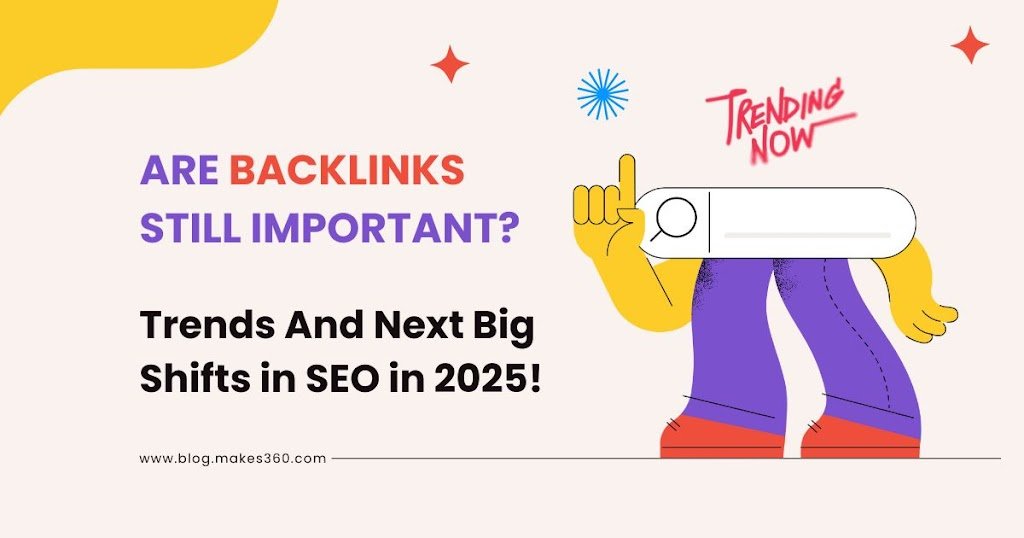Backlinks have been a big part of SEO for a long time!
Did you know that websites with a high number of quality backlinks are 3.8 times more likely to rank higher on Google?
Backlinks are often seen as one of the most important ways to rank higher on Google. But are backlinks still important?
Recent changes and comments from Google show that the role of backlinks is changing. While they are still helpful, their importance is now balanced with other things like content quality, user experience, and page speed.
This means backlinks are still important, but they aren’t the main thing anymore. To be successful in SEO, you need to focus on more than just backlinks. You should still work on getting good backlinks, but you also need to pay attention to other parts of your website. The importance of backlinks is changing, and it’s necessary to keep up with these changes to stay successful in SEO.
To stay competitive in SEO, you need to understand these changes and update your backlink strategies. Backlinks are still important, but their power is now shared with other factors. SEO success now requires a mix of strong backlinks, great content, technical SEO, and a good user experience.
AI is also changing how search engines rank websites, making SEO more complex and exciting.
In this blog post, we’ll explore new ways to build backlinks and how future trends will shape our strategies. We’ll also discuss how AI is affecting SEO, especially in analyzing backlinks and content quality. Staying informed and adaptable is key to keeping up with the evolving SEO landscape.
Are Backlinks Still Important?
Backlinks are still very important for SEO, but the way they work has changed over the years.
According to a study by SEMRush in 2024, backlinks are still one of the top 10 factors for ranking on search engines.
Another company, FirstPageSage, said that backlinks make up about 14% of how Google ranks websites, which is a pretty big deal.
Backlinks are still important, but the strategy for getting them has changed a lot. Today, quality matters more than quantity. In the past, websites could get a lot of backlinks, even if they were from low-quality sites, and still rank well.
Now, Google is smarter 🤓 and prefers backlinks from trustworthy, high-quality websites. Websites that build links with reputable, industry-related sites and have natural link profiles rank better than those that just have lots of low-quality links.
For example, websites that rank for popular keywords like “SEO” usually have many backlinks from well-known, trusted sites like Moz, Ahrefs, or Neil Patel’s blog.
As search engines change the way they rank websites, are backlinks still as important as before? The short answer is yes – but the way backlinks affect your website’s ranking is changing. To succeed in SEO, it’s important to understand these changes and adapt.
The Current State of Backlinks
Backlinks are like votes from one website to another, showing search engines that the content is valuable and trustworthy. In the past, the more backlinks a page had, the higher it would rank. But this led to some people trying to cheat the system by creating lots of low-quality links, like link farms or spammy guest posts.
To stop this, Google created updates to its algorithm like the Penguin update to fight spammy backlinks and make sure only good, relevant backlinks helped a website’s ranking. Now, quality matters more than quantity. A few high-quality backlinks from trustworthy websites are much better than hundreds of low-quality ones.
Where Are Backlinks Going?
The role of backlinks is continuing to change as technology like artificial intelligence (AI) and natural language processing (NLP) get better. Here are some trends that show where backlinks are heading:
1. Quality Over Quantity
Google now cares more about the quality of links rather than how many you have. Search engines are getting better at understanding the context of backlinks. A link from a trusted website in your field is worth much more than many links from unrelated, low-quality websites. This means marketers should focus on building real, valuable relationships instead of trying to get as many links as possible.
2. Linkless Mentions
Linkless mentions, or implied links, are becoming more important in SEO. These are mentions of your brand or website without a clickable link. Search engines are getting smarter at recognizing these mentions and using them as signals of trust and authority. If a brand or website is talked about in a positive way, even without a link, it still shows credibility.
3. User Experience and Content Quality
Backlinks alone won’t be enough to rank high. Search engines are putting more focus on user experience and content quality. A website with great content that helps users will naturally attract high-quality backlinks. Search engines are also using AI models, like BERT, to better understand content and user intent. This means focusing on good content and user engagement will help attract organic backlinks and improve rankings.
4. Less Focus on Traditional Link Building
Google’s recent updates have highlighted the importance of E-E-A-T (Experience, Expertise, Authoritativeness, Trustworthiness). Backlinks are still a sign of authority, but they are now just one part of a bigger picture of website quality. Other factors, like positive user signals (low bounce rates, high time on page), are becoming more important. Building lots of backlinks might not be as effective as building a strong brand and good user experience.
5. AI and Backlink Analysis
AI is changing how backlinks are evaluated. Machine learning tools can now understand how trustworthy and relevant links are by looking at the content and context of the link. AI will play a big role in finding real links, making it harder for people to use black-hat SEO tactics.
How to Survive and Succeed in the New SEO World
To keep up with these changes, it’s important to adapt. Here are some strategies to help you stay successful as backlinks evolve:
1. Create High-Quality, Engaging Content
Content is still the most important thing. Creating valuable, helpful, and well-researched content will naturally attract backlinks from trusted sources. Content that answers questions, solves problems, or offers unique insights will always be valuable, and other websites will want to link to it.
2. Build Real Relationships in Your Field
Networking with other professionals in your industry is a great way to get high-quality backlinks. Guest posting on respected blogs, collaborating on content, or being active in forums and events are good ways to create a network of relevant backlinks. Focus on giving value and building real relationships.
3. Use Linkless Mentions
Encourage people to mention your brand or content, even if they don’t link directly. You can do this by creating great content, being a guest on podcasts, or being active in industry discussions. Keep track of your brand mentions online to make sure they add to your credibility.
4. Improve User Experience on Your Website
A good user experience (UX) is now an important SEO factor. Make sure your website is easy to use, works well on mobile devices, and loads quickly. A good UX shows search engines that your website is valuable, which can lead to natural backlinks from happy users.
5. Optimize for E-E-A-T
Show your expertise and authority through well-written content. Be transparent and showcase trustworthiness with testimonials and author profiles. Websites that show high levels of E-E-A-T are more likely to get good backlinks and improve their rankings.
6. Avoid Manipulative Link-Building Tactics
Tricks like buying links, link schemes, and spamming forums no longer work. Search engines are getting smarter at finding these tactics, and they can lead to penalties. Instead, focus on building links that are valuable and relevant to your industry.



Nice Article.
Your mode of telling the whole thing in this article is in fact pleasant, all can without difficulty be aware of it, Thanks a
lot.